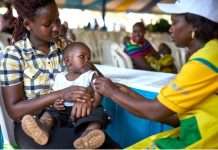Worried by the global burden of cancer, especially among children, with 300,000 new cases diagnosed annually from children aged 0-19 years, the World Health Organisation (WHO) has announced a new effort – the WHO Global Initiative for Childhood Cancer, with a goal of reaching at least a 60% survival rate for children with cancer by 2030, thereby saving an additional one million lives.
According to a release from the apex health institution, this new target represents a doubling of the global cure rate for children with cancer.

The fact remains that cancer is a leading cause of death among children, and to stem the mortality rate, the WHO report explained that it targets a twofold objective from the new initiative, which are increased prioritization of childhood cancer through awareness and expansion of national cancer care centres for optimum care.
“Too many children have their lives cut short by cancer, and survival rates in poor countries are scandalously lower than those in wealthy countries,” said Dr Tedros Adhanom Ghebreyesus, WHO Director-General. “We hope our partnership with St. Jude will be a step towards redressing that injustice.”
The Initiative is announced on the heels of the Third Global High-Level Meeting on Noncommunicable Diseases, which convened dozens of heads of state and ministers from all countries to prompt more urgent action on noncommunicable diseases – among them cancer, diabetes, heart and lung diseases – which kill 41 million people each year.
The statement reads in part: “The aims of the Initiative are two-fold: to increase prioritization of childhood cancer through awareness raising at global and national levels and to expand the capacity of countries to deliver best practice in childhood cancer care. Concretely, WHO will support governments to assess current capacities in cancer diagnosis and treatment including the availability of medicines and technologies; set and cost priority cancer diagnosis and treatment programmes; and integrates childhood cancer into national strategies, health benefits packages and social insurance schemes.
“The WHO Global Initiative for Childhood Cancer, which involves development of a WHO technical package to help scale-up capacities within national health systems, will be achieved with support from a host of partners. Among them is St. Jude Children’s Research Hospital in the United States, the first WHO Collaborating Centre on childhood cancer, which has committed US$ 15,000,000 to supporting implementation of the initiative”.
It further noted that the event is a milestone in furthering achievement of the Sustainable Development Goals (SDGs) in particular SDG target 3.4 to reduce premature mortality from noncommunicable diseases by one third by 2030.













tadalafil reviews – generic tadalafil tadalafil cheap tadalafil